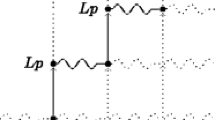Abstract
We present a Hilert style axiomatisation for the set of formulas in the temporal language withF andP which are valid over non-transitive cyclical flows of time.
We also give a simpler axiomatisation using the slightly controversial ‘irreflexivity rule’ and go on to prove the decidability of any temporal logic over cyclical time provided it uses only connectives with first-order tables.
Similar content being viewed by others
References
van Benthem, J.The Logic of Time, Reidel, Dordrecht, 1983.
Burgess, J. P. ‘Basic tense logic’, in:Handbook of Philosophical Logic, ed. Gabbay, D. and Guenthner, F., D. Reidel, 1984.
Cameron, P. J.Oligomorphic Permutation Groups, London Mathematical Society Lecture Note Series, number 152, Cambridge, 1990.
Gabbay, D. M. ‘An irreflexivity lemma’, in [15], pp. 67–89.
Gabbay, D. M. ‘Expressive functional completeness in tense logic’, in [15], pp. 91–117.
Gabbay, D. M. and Hodkinson, I. M. ‘An axiomatization of the temporal logic with Until and Since over the real numbers’,J. Logic and Computation 1 (1990), 229–259.
Gabbay, D. M., Hodkinson, I. M. and Reynolds, M. A. ‘Temporal expressive completeness in the presence of gaps’, inProceedings ASL European Meeting, 1990, Helsinki, vol. 1 of Lecture Notes in Logic, Springer-Verlag 1991.
Gödel, K. ‘A remark about the relationship between relativity theory and idealistic philosophy’, inAlbert Einstein: Philosopher-Scientist, Schilpp, P. A. (ed.) 3rd edition, Cambridge University Press, London, 1970.
Henkin, L. ‘The completeness of the first-order functional calculus’,J. Symbolic Logic 14 (1949), pp. 159–166.
Hodkinson, I. M., ‘Finite H-dimension does not imply expressive completeness’, to appear inJ. Philosophical Logic.
Huntington, E. V. ‘A new set of postulates for betweenness, with proof of complete independence’,Trans. Amer. Math. Soc. 26 (1924), pp. 257–282.
Jaspers, K.General Psychopathology, translated from the German 1946 edition by Hoenis, J. and Hamilton, M. W., Manchester University Press, 1963.
Koller, J. M.Oriental Philosophies, Charles Scribe's Sons, New York, 1985.
Lachlan, A. H. ‘Countable homogeneous tournaments’,Trans. Amer. Math. Soc. 284 (1984), pp. 431–461.
Monnich, U. (ed.),Aspects of Philosophical Logic, Reidel, Dordrecht, 1981.
Newton-Smith, W. H.The Structure of Time, Routledge and Kegan Paul, London, 1980.
Nietzsche, F.Thus Spoke Zarathustra, Part 3 (1884), e.g. inWerke in drei Bänden, herausgegeben von Karl Schlechta, Munich, 3rd edn, 1965.
Prior, A. N.Time and Modality, Clarendon Press, Oxford, 1957.
Rabin, M. O. ‘Decidability of second order theories and automata on infinite trees’,Trans. Amer. Math. Soc. 141 (1969), pp. 1–35.
Reynolds, M. ‘An axiomatization for until and since over the reals without the IRR rule’,Studia Logica 51 (1992), pp. 165–194.
Y. Venema, ‘Completeness via Completeness: Since and Until’, in:Colloquium on Modal Logic 1991, ed. M. de Rijke, ITLI-Network Publication, Dutch Network for Lang., Logic and Information, Amsterdam (1991), pp. 279–285.
Author information
Authors and Affiliations
Rights and permissions
About this article
Cite this article
Reynolds, M. Axiomatisation and decidability ofF andP in cyclical time. J Philos Logic 23, 197–224 (1994). https://doi.org/10.1007/BF01050343
Issue Date:
DOI: https://doi.org/10.1007/BF01050343




